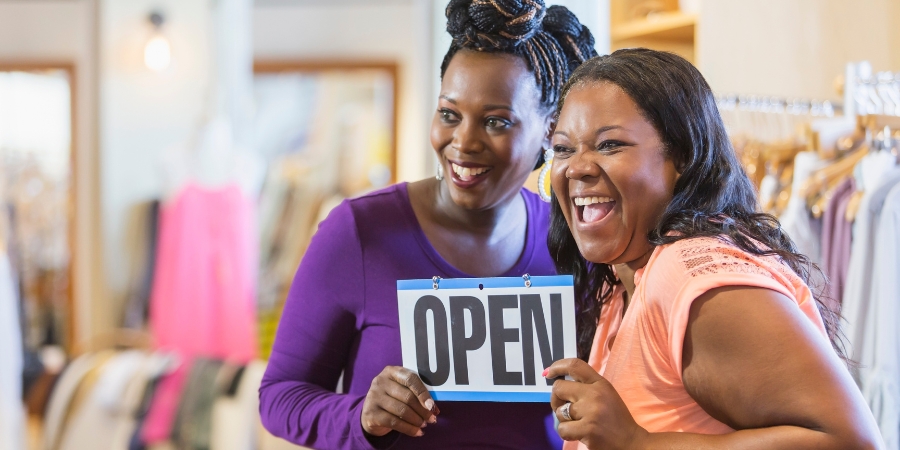
Photo: Canva
Retailers Help Generate $14 Billion for Black-Owned Companies
Retailers have been making good on their pledges to support Black-owned businesses, resulting in $14 billion in revenue driven to these companies since May 2020, according to CNBC. This success has been spearheaded by the Fifteen Percent Pledge, a nonprofit that asks major retailers to dedicate 15% of their space to Black-owned brands to mirror the Black community making up 15% of the U.S. population.
Major participants in the Fifteen Percent Pledge include Sephora, Ulta Beauty, Gap, Nordstrom, and Macy’s. Every partner has pledged to reach the 15% goal within 10 years of signing their contract — and in many cases, this means growing the share of Black-owned brands on the shelf from a starting point of less than 3%.
Fifteen Percent Pledge was created in 2020 in the wake of protests that followed George Floyd’s murder. The pledge’s founder, entrepreneur Aurora James, wrote an Instagram post calling for companies to support the Black communities that host and spend at their stores.
More than 625 Black-owned businesses have started working with Fifteen Percent Pledge partners since the initiative started. Retailers outside the pledge have made efforts to improve the visibility of Black-owned brands on their shelves as well. For instance, Target, which has committed to investing more than $2 billion in Black-owned businesses by 2025, achieved a 65% increase in Black-owned beauty offerings in 2022 compared to 2020.
There is still much more work to be done to achieve true equity. A study by JUST Capital found that only 4% of the largest companies in the U.S. managed to close the racial pay gap as of 2022, according to CNBC and JUST Capital. Additionally, CNBC’s calculations based on Federal Reserve data found that Black households’ total wealth was $6.25 trillion in March 2023, just 5% of white households’ total wealth of $115.65 trillion.
Retailers can earn business-minded benefits for bringing on additional Black-owned brands as well. Nearly half (45%) of consumers want to support diverse brands, according to data from McKinsey.
The firm also found that Black consumers are up to 2.3 times more likely than non-Black consumers to switch to a Black-owned apparel or footwear brand. With Black consumers’ spending on apparel and footwear expected to grow by 6% annually through 2030, this presents an opportunity for retailers to tap into a valuable demographic while helping underserved entrepreneurs.
Discussion Questions
DISCUSSION QUESTIONS: Do you expect more major retailers to continue joining the Fifteen Percent Pledge or similar programs? How can the bottom line benefit from retailers carrying more Black-owned brands and participating in other ESG-focused initiatives?



It is great news that Black owned brands are getting more visibility and support. And from the sounds of it, their products are proving popular which is good for them and for the retailers stocking them. I also think it’s important to give customers more choice. In areas like beauty, Black people have particular needs – such as in haircare or cosmetics. They should be able to walk into a store and find products that are right for them. It’s often easier to achieve that if you have a diverse range of suppliers who understand their end-users.
Well said, Neil. The only thing I would add is that I’ve noticed retailers calling out products on the shelves that are supplied by minority-owned businesses. This gives consumers an opportunity to make a choice to try a new product or support a business that maybe they would have passed over.
My grocery store flags products from companies that are minority-owned and women-owned, which helps me to support those sellers. Let’s see more.
What I love most about the support for Black owned businesses are the opportunities for financial growth in the private sector, and within the wonderful world of capitalism. Big government has NEVER been the right solution for people of any color, and the more we can do as an industry to encourage private sector income and development, the better country we shall be.
Diversity of product sourcing remains an area of opportunity for the retail community at large. Not only can black-owned and women-owned businesses provide compelling new products for retail, but their growth will spawn additional economic impact that will provide job growth and investment in under-served business segments.
Walmart’s Open Call Event remains a key driver of this effort in the broader context, although a number of other retailers are leaning in on this important initiative.
Why it would take murder to have retailers change the way the support Black-owned businesses is a topic worthy of its own discussion. That retailers nonetheless took action in closing the Black representation gap among their suppliers is perhaps one way shine a light on an otherwise dark story.
I applaud retailers who took the pledge and those that are taking their own action steps to increase Black-owned representation in their stores. But for far too many retailers, there is still little or no action at all.
It’s easy to think that Black-owned brand’s will only appeal to Black customers (and therefore why bother), but Target has done a good job demonstrating otherwise. Retailers don’t need to have Black customers to support Black-owned businesses. They just need to see how their scale can help bridge racial income gaps and believe it’s a worthwhile effort to do so.